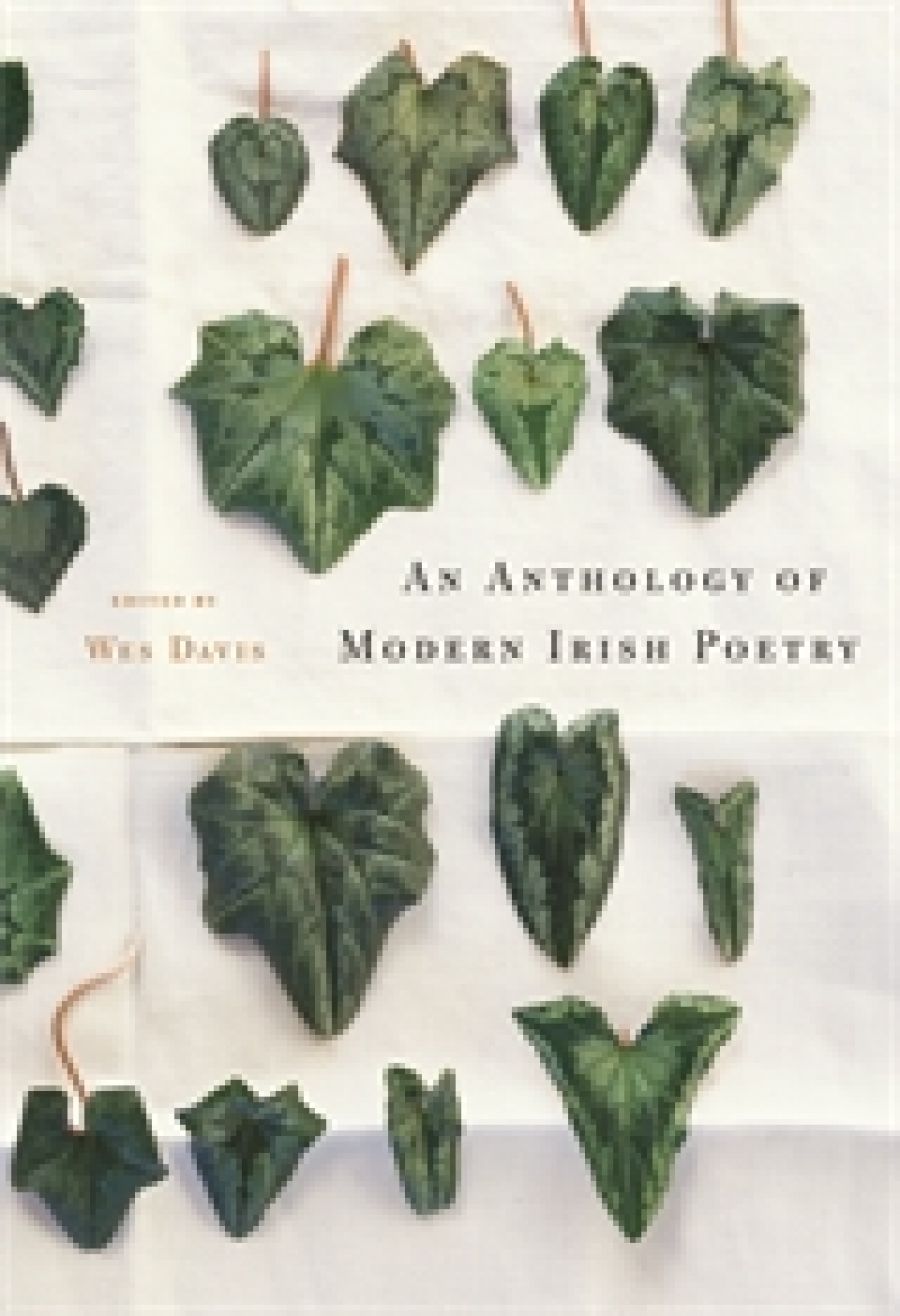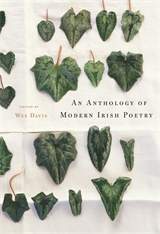
- Free Article: No
- Contents Category: Poetry
- Review Article: Yes
- Article Title: 'A twisted root'
- Online Only: No
- Custom Highlight Text:
For W.B. Yeats, Ireland was the place and source of poetry, even when he was living in Oxford or London. It was also a mythical figure, enabling of ardour and of song, the desirable ‘Cathleen, the daughter of Houlihan’; and it became a delicately evocative crepuscule, mocked by Brendan Kennelly when he opens a poem with ‘Now in the Celtic twilight decrepit whores / Prowl warily along the Grand Canal’. The very phrase ‘Irish poetry’ sounds like a pleonasm. For that moist country has long seemed synonymous with verse and folksong: just as Holland is synonymous with painting and France with elegant thought. Further, when I think of contemporary poets in our widespread language, Seamus Heaney must surely be the dominant world figure and Paul Muldoon the most verbally dazzling, even if our Les is close to Paul in this caper.
- Book 1 Title: An Anthology Of Modern Irish Poetry
- Book 1 Biblio: Harvard University Press (Inbooks), $59.95 hb, 600 pp
- Book 1 Cover Small (400 x 600):

Yes, the Irish can still write wonderful poetry, with or without the hypothesised Celtic tiger, and now the Belknap Press of Harvard has produced a fine plump anthology of poets and poetry from Paddy Colum to Sinéad Morrissey. Many will be familiar as turf to Australian readers; at least ten of them have actually performed in this country, notably Colum with his quietly savage Dublin wit, John Montague with intermittent stammer, and David Wheatley who was to go on and write so responsively about our fauna – in prose. Moreover, Ciaran Carson has a bone dry poem here about Wollongong.
This is a fine collection, almost inexhaustible, you might say: with nearly a thousand pages of poems, introductions and notes, it would probably give you RSI should you try to read it in bed. It contains fifty-three poets, each with a large enough tranche of work for us to have a good sense of his or her quality. A few, C. Day Lewis for example, seem marginal to Irish culture, his best poem actually being couched in praise of England; while Beckett’s avant-garde poetry would surely not have made the cut if he hadn’t been a great dramatist and novelist.
The one striking omission is mellifluous Donagh MacDonagh, whose ‘Bridin Vesey’ is a poem that will always tweak the heartstrings: the closest ballad to it here is Colum’s ‘She Moved through the Fair’, which in fact has anonymous antecedents. Yes, the past treads at our heels.
Remotest from us, perhaps, are the translated poems by Aran islander Máirtin Ó Direáin with their large hypnotic stanzas, whereas Nuala Ní Dhomnaill’s Gaelic is brought across to us in skinny, recognisable measures of free verse. There is also the point argued here that Seán Ó Riordáin resuscitated the native language, making it an available poetic medium for his juniors, though it is hard to know how long that is going to last. Languages are dying all the time, across our planet, like species of plants and of animals.
Yeats, the grandiloquent master from whom all Irish poets must wriggle and strain to escape, wrote in a chapter on his Tragic Generation that he ‘resented being invited to admire dialogue so close to modern educated speech that music and style were impossible’. After Colum and perhaps Louis MacNeice, few of these poets could live easy in the master’s shadow, in the wake of his magnificent rhetoric; they swerved, variously, toward some American models as John Montague did, or toward Europe with dark-hued Tom Kinsella. It is Montague who directly anatomises ‘The Lost Tradition’ when he can find ‘The whole landscape a manuscript / We had lost the skill to read, / A part of our past disinherited’.
Some of their number swerved further, into comedy, with ebullient Carson deconstructing Dresden in this oblique fashion:
Flynn was in for seven years and learned to speak
The best of Irish. He had thirteen words for a cow in heat;
A word for the third thwart in a boat, the wake of a boat on the ebb-tide.
Or sardonically rebounded against themselves, as in the opening stanza of Conar O’Callaghan’s ‘Fiction’: ‘None of this is true. / We’re still all / we crack ourselves / up to be.’ All a long way from Yeatsian, yet these poets also had their distinct ‘generation’, those who came through Queen’s College, Belfast, with Heaney and then a mini-generation he taught there: the dashing company of Frank Ormsby, Muldoon, Carson and word-spinning Medbh McGuckian. It is an intriguing point about creative interaction and fruition that these young writers should have meshed in Protestant Ulster. Indeed, Ulster barges in everywhere across this wide-ranging collection of art’s testimonies, whether as subject or as anterior source.
Poetry aside, the Anthology is well set up for information and for our further reference. The short introductory pieces – one for each poet – are full of disparate goodies. I particularly liked the piece of folklore about the doom-laden Titanic, somebody claiming ‘that the ship foundered because anti-Papist slogans were painted on its hull by the Belfast shipyard workers’.
Formally, most of the verse here is relatively conservative, as though the poets believe that they may still have an audience: Irish poets apparently love regular stanzas, even those who have moved far away from song. The mathematics of language remains the shaper of its music. Even the women poets, who might be expected to shake off old shackles, respect the good old carpentry of stanzas. And the Marvellian couplet can make its sharp point in Muldoon’s ‘If Yeats had saved his pencil-lead / would certain men have stayed in bed? // For history’s a twist-ed root, / with art its small, translucent fruit.’
Those who read, as most of us will, for classic, excellent or definitive poems will find them here. Mahon has ‘A Disused Shed in Co. Wicklow’, McGuckian offers ‘Marconi’s Cottage’, Murphy has substantial extracts from ‘The Battle of Aughrim’, while urban Dennis O’Driscoll gives us ‘The Clericals’; and there are two of Heaney’s definitive poems about the darkened bog people of Jutland. For the styles of later pasquinade, Enda Wyley serves us up ‘Eating Baby Jesus’, and Hull-based Wheatley a vividly deconstructed concrete sonnet.
The poetry is drenched by the night-mare of history, being the product of the oldest post-colonial culture in our language. What is more, recurrent slants on earlier history serve as metaphors for Ireland’s violence of the twentieth century, a repeated wave of killings, looking back on which Sinéad Morrissey has written that ‘The only honesty is silence’. Others could not hold their tongues, Michael Longley writing of a bus conductor
shot through the head
By a shivering boy who wandered in
Before they could turn the television on
Or tidy away the supper dishes.
To the children, to a bewildered wife,
I think ‘Sorry Missus’ is what he said.
Just think of how that mild adjective, ‘bewildered’ is laden with feral, historical meanings. Civil conflict brings up the consequences of violence quite bizarrely, as Colm Tóibín showed us in his courageous prose work about hiking along a troubled frontier, Bad Blood: A Walk Along the Irish Border.
Like Prospero’s island, poetry has many voices, many ways of bearing testimony. And the deep, yet common, Poco paradox is that the Gaelic writers have to be read in English. As we will read them in Wes Davis’s generous anthology, beside their anglophone fellows.


Comments powered by CComment